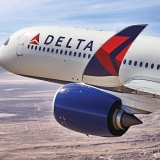Delta CEO Assures Return to Normalcy After Tech Turbulence
In the high-stakes world of aviation, a week can feel like a lifetime, especially when a major airline is in the throes of a technological crisis. Delta Air Lines CEO Ed Bastian announced that operations are expected to return to normal on Thursday after a global outage caused by a CrowdStrike update left the carrier in disarray for nearly a week. Bastian’s assurances come as a beacon of hope for passengers and employees alike, signaling the end of a tumultuous period marked by widespread disruptions and cancellations.
In an updated note to customers on Wednesday, Bastian stated that Delta would operate “at a traditional level of reliability,” offering a much-needed sense of stability after days of chaos. The disruptions were reportedly down by 50% on Tuesday compared to the previous day, and cancellations on Wednesday were expected to be “minimal.” This rapid improvement is a testament to the airline’s resilience and the relentless efforts of its staff to restore normalcy.
The outage, which stemmed from a “defect found in a single content update for Windows hosts,” hit Delta harder than any other U.S. carrier. From Friday to early Monday, there were a staggering 8,500 total cancellations among all U.S. flights, according to data from FlightAware. Delta alone accounted for 4,500 of those cancellations, with an additional 800 flights canceled by its regional carrier, Endeavor. These numbers highlight the scale of the disruption and the significant challenge Delta faced in getting its operations back on track.
As Delta navigates the aftermath of this crisis, Bastian’s leadership will be crucial in restoring customer confidence and maintaining the airline’s reputation for reliability. Clear communication and transparency about the steps being taken to prevent future outages will be essential. Additionally, compensating affected passengers and addressing their concerns promptly will go a long way in rebuilding trust.
This incident also serves as a stark reminder of the vulnerabilities inherent in our increasingly digital world. Airlines, more than most industries, rely on complex networks of technology to ensure smooth operations. When these systems fail, the consequences are immediate and far-reaching. Robust contingency plans, regular system audits, and proactive measures to address potential vulnerabilities are no longer optional; they are imperative to prevent such widespread disruptions in the future.
For Delta, the path to recovery is not just about fixing the immediate problems but also about learning from this experience to strengthen its systems and processes. Bastian’s commitment to returning to a “traditional level of reliability” is a positive step, but the true test will be in how Delta uses this crisis as an opportunity to enhance its resilience and better serve its customers in the long run.
As passengers, we place our trust in airlines to get us to our destinations safely and on time. Delta’s response to this crisis will be closely watched, and the lessons learned will hopefully lead to a more robust and reliable aviation industry. For now, we can take comfort in Bastian’s assurances and look forward to a smoother journey ahead.






